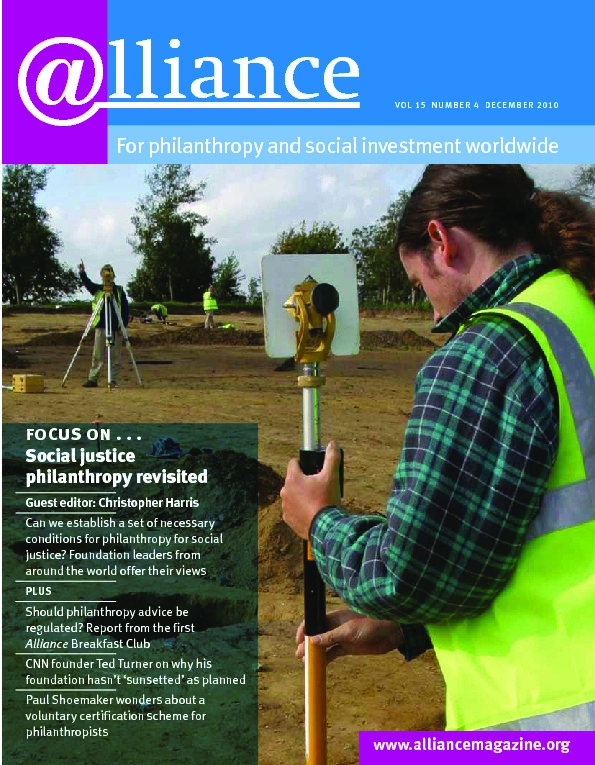Should philanthropy advice be a regulated field? If so, should it be externally regulated or self-regulated? What would the qualifications be for joining the profession? What are the key ethical issues involved in setting standards? Are banks offering philanthropy advice a special case? These were the questions before the first Alliance Breakfast Club meeting, held at Coutts Bank in London on 29 September.
The aim of the meeting was to pursue some of the issues raised in the September Alliance special feature entitled ‘Philanthropy advice: a profession in search of standards’.
Clearly people are wary of the whole idea of regulation. The meeting began with a series of questions to the audience, from which it emerged that while a third of the 40-50 people present agreed that the field of philanthropy advice lacks consistent professional standards, only four felt that it should be regulated.
Two out of the three panellists were similarly ambivalent about the idea. Olga Alexeeva of Philanthropy Bridge Foundation felt that for most of the world it is simply too soon. At least half of the donors she meets in southern countries don’t think of themselves as donors, she said, let alone as needing advice. And some of them don’t understand the term philanthropy. So regulation may be appropriate for the UK and the USA, but not for most of the rest of the world for another 20 years.
Michael Alberg-Seberich of Berlin-based Active Philanthropy felt there are already lots of standards in the legal and tax areas, but we need to think about ethical standards for giving – and here, he insisted, the first step is transparency about what exactly advisers are offering and why. Some large NGOs, for example, have foundation advisers whose role is basically to attract foundation grants for the NGO’s projects. There is nothing intrinsically wrong with this as long as the situation is clear to those being ‘advised’. Interestingly, both Alexeeva and Alberg-Seberich mentioned the fuzzy line between fundraising and advising.
A model for self-regulation
Maya Prabhu, Head of UK Philanthropy at Coutts, was more open to the idea of some sort of self-regulation for the field. Professional standards and ethics are needed, she felt, in a field where anyone can set up their own philanthropy advisory firm. But this isn’t about policing, she insisted, but about having ‘a framework, a loose body where people can share best practice’. She pointed out that the Family Firm Institute (FFI), a similar industry concerned with family business advising, has done this quite successfully.
FFI offers conferences, courses, publications, best practices, etc. It offers its members two certificates which distinguish them as having achieved at least a basic professional knowledge. While these certificates provide an entry qualification, no one present had heard of anyone being expelled by FFI for failing to meet the standards. The Association of Fundraising Consultants, initially formed to develop a code of ethics, does explicitly advertise that people can complain if consultants breach their code of ethics. The Chartered Financial Analyst qualification, recognized worldwide, provides another example of the self-regulation model.
Despite their initial wariness, many in the audience seemed comfortable with this level of self-regulation. One limitation, pointed out by Remi Ayiela of Cavendish Law, was that while FFI might have credibility with other professionals, their clients mostly know nothing about it. An industry regulating body needs to create awareness outside its own industry.
Is passion enough?
Rosamund McCarthy of law firm Bates Wells and Braithwaite sounded a note of caution about entry qualifications. Anyone can be a trustee of a charity, she said, and why not a philanthropy adviser. She gave the example of a former employee of ActionAid India who might actually be in a good position to give philanthropy advice. Surely the most important thing is to have passion and commitment, she said. If we over-regulate, we may lose something very precious.
Not everyone present saw passion as a good thing per se. It depends what you’re passionate about. In Alberg-Seberich’s experience, most people want to become philanthropy advisers for one of two reasons – they’re passionate about an issue, or they want to work with rich people. A characterization that philanthropy consultant Theresa Lloyd said she ‘simply didn’t recognize’.
All three panellists agreed that being passionate and knowledgeable about one cause isn’t enough for a philanthropy adviser. How do you find the ‘in-betweens that bring wider knowledge’, asked Alberg-Seberich. Advisers need knowledge of givers, knowledge of beneficiaries and access to both, said Alexeeva. Donor advice is wider than specific charities or causes, said Prabhu. You also need to have some understanding/knowledge of donors’ aspirations, philanthropy strategies and measuring impact.
Advisers should advise donors about questions they should ask potential beneficiaries, said Theresa Lloyd. Then they must ‘fly free’. If people are motivated by passion for a particular cause, said Warren Lancaster of Geneva Global, they would do better to work with a charity. The motivation he sees for advisers is avoiding ‘wastage’ – of donor money that could be better used.
Are the banks a special case?
Asked whether banks offering philanthropy advice are a special case, given the position of trust they already hold with their clients and the potential for conflicts of interest (see article in the September issue of Alliance, it was inevitably pointed out that regulation hasn’t done much good for the banks’ main business: ‘If it had, we wouldn’t be in this financial mess.’
Those representing banks on the whole didn’t feel banks should be seen as a special case. Maya Prabhu stressed that it is important to recognize conflicts of interest across the board – a point echoed strongly by Mario Marconi of UBS. We live in a world of conflict of interests, he said; he didn’t see banks as being very different to others providing advice. Transparency with the client – properly explaining what motivates you – is key here.
The need for neutrality
Prabhu also made the point that advisers with banks need to give good, objective advice otherwise they will damage the relationship and may lose the client. Emma Turner of Barclays Wealth stressed the need for advisers with banks to be ‘totally neutral’; they are there to facilitate and guide their client to do what is right for them. You can throw away the reputation of the bank with one silly remark or suggestion, she said.
Jason Jarvis of Coutts drew a parallel with the mainstream investment world. What is advice, he asked. If someone looking to buy securities asks the ring dealer, ‘How is oil doing?’ he’s asking for information. But ‘what should I do?’ is a request for advice. Philanthropy advisers, too, need to make a distinction between educating and informing clients as opposed to giving them advice about what they should do. When they’re giving advice, he suggested, they need some form of standards/internal regulation so they can demonstrate a degree of ‘threshold competence’.
The dangers of DIY philanthropy
Not everyone agreed that banks are no different from other advisers. Alexeeva mentioned the potential for ‘boardroom pressure’ on advisers to encourage clients to set up their own foundation, held within the bank, rather than giving money to a charity (exactly what happened in the case reported in the September issue of Alliance). What she called an ‘epidemic of DIY philanthropy’ means that 90 per cent of money given doesn’t reach the charitable sector. Hence the need for banks to be transparent about their fees and where their income comes from and how/why they provide advice.
Alberg-Seberich expressed similar concerns, suggesting that more and more banks are offering ‘impact investment’, with clients’ own foundations, held by the bank, as the tool for investment.
Another issue raised by Alexeeva – and applying equally to banks and other advisers – was outsourcing. Advisers need to be willing to pass clients on to advisers who are experts on the cause/country they are interested in. The tendency to keep everything in house has to be resisted. In the case of banks, one mistake can lose the client not just for the bank but for philanthropy for ever because trust is gone.
Where next?
Where next? David Ainslie of law firm Stone King suggested a softly softly approach. ‘We don’t need government regulation like the Financial Services Authority,’ he said. ‘Like-minded people who believe it’s time for standards will need to create an association of philanthropy advisers.’ Initially this should be a broadly based membership structure. ‘Later on you can tighten the rules.’
In fact there are initiatives under way, some of which are reported in the September issue of Alliance. ‘I’ve a feeling this is only the beginning,’ said Olga Alexeeva in summing up. She could have been summing up for everyone.
For more information
NPC’s steering group on philanthropy advice: http://www.philanthropycapital.org/how_we_help/big_ideas/steering_group_of_advisors.aspx
EAPG’s code of practice, available from EAPG: http://www.eapg.org.uk
NNCG’s code of practice: http://www.nncg.org/downloads/NNCG_Code_Ethical_Conduct_Final.pdf
STEP’s philanthropy advisers group: http://www.step.org/news/press_releases/2010/step_launches_philanthropy_a-1.aspx





Comments (0)